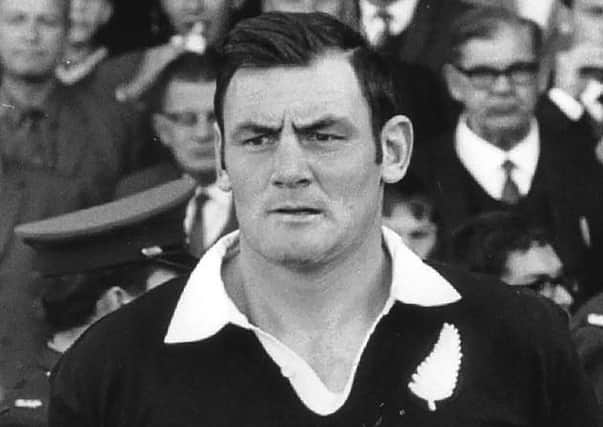Obituary: Sir Brian Lochore, All Blacks legend and sheep farmer


Brian Lochore, who has died after a short battle with bowel cancer, was one of the greatest of all All Blacks players, captains, coaches, managers and selectors.
But, his feats on the playing paddock were matched by his exploits off it. Indeed, in many ways he was the archetypal All Black. There is the legendary story of his 25th and final Test cap in 1971. He had retired a year earlier, and gone back to his sheep farm outside Masterton. But, the ABs had an injury crisis in the pack and a crucial Third Test against the Lions just two days away – the call went out to Lochore: please, come and help us out.
Advertisement
Hide AdAdvertisement
Hide AdHe dashed off at short note to his wife Pam: “Playing in Test tomorrow, will call later,” packed his kitbag and headed off to Wellington, 100 kilometres away. In legend the All Blacks would have won, and the recalled Lochore would have scored the winning try.
However reality intervened; he gave his all, but, not match-sharp and playing out of position at lock, he was overshadowed on the day by his immediate opponent, debutant Gordon Brown; the Lions won, on their way to a historic series win. Lochore hung up his boots for good after the match, while “Broon From Troon” never looked back.
Back in Masterton, Lochore coached the local club, then Wairarapa-Bush, the local Union, before, in 1983, he was appointed to the three-man All Blacks coaching panel, where he led them to victory in the inaugural Rugby World Cup in 1987. In 1995, as Team Manager, he saw another All Blacks squad reach the Rugby World Cup Final, where they lost to South Africa. Then, in 2011, he was a Selector as the All Blacks lifted their first World Cup since that inaugural event in 1987.
Wairarapa-Bush is one of the smaller New Zealand Unions, so it says much for his talent that, after a stand-out performance for Wairarapa-Bush, who lost 37-11 against the star-studded 1959 Lions of Ken Scotland, Tony O’Reilly, Hughie McLeod and Co, he was seen as a future All Black.
However, it took him until 1964 to become All Black number 637, when he won his first cap, in a victory over England, at Twickenham during the All Blacks Tour of Europe, which saw them lose one game, to Newport, and be held to a draw by Scotland at Murrayfield, to spoil an otherwise winning run.
He went on to cement his place in the team and, in 1965 when another future knight, Sir John Graham, retired, Lochore became All Blacks captain. He led them to a series win over Mike Campbell-Lammerton’s 1966 Lions in New Zealand – where he greatly impressed Jim Telfer – then through the unbeaten tour of Canada and Europe in 1967, where they were denied a Grand Slam by the foot and mouth outbreak which prevented them from playing in Ireland.
The fact a player from one of the smaller unions, as Lochore was, should be the national captain is perhaps the equivalent of a Montrose or a Brechin City player captaining the Scottish national football side.
Lochore retired after the All Blacks’ disappointing injury-hit tour to South Africa in 1970, handing over the reigns to another future knight, his lifelong friend Sir Colin Meads. The fact that four straight All Blacks captains – Sir Wilson Whineray, Graham, Lochore and Meads – were all knighted speaks volumes of the company he kept.
Advertisement
Hide AdAdvertisement
Hide AdBut, rugby was not the only field on which he excelled. As a young man he had played tennis for the Wairarapa representative team; indeed, after he gave up rugby, he played for them again as a senior.
He was one of the leading breeders, judges and advocates of the Romeny sheep, the dominant breed in New Zealand, keeping an excellent flock on his sheep station outside Masterton. He was, for eight years, chairman of the Queen Elizabeth II National Trust, a New Zealand a charitable body set-up in 1977: “to encourage and promote, for the benefit of New Zealand, the provision, protection, preservation and enhancement of open space”.
The trust enables landowners to protect special features on their land through its open space covenants, partnering with private landowners to protect natural and cultural heritage sites on their land.
Naturally, honours were showered on him, an OBE on his retirement from rugby in 1970; a knighthood (to be exact, Knight Commander of the Order of New Zealand) in 1999; then his country’s highest honour, the Order of New Zealand in 2007.
He was inducted into the World Rugby Hall of Fame in 1999, while the winners of New Zealand’s highest domestic championship, the Heartland Championship, get to hold the Lochore Cup.
In later years, he turned to golf, where he had the reputation of being a “bandit”, a better player than his handicap indicated, while he was a master of the mind games on the course.
He is survived by Lady Pam, son David, daughters Joanne and Sandra and eight grand-children.
In rugby folklore, his great friend and contemporary Colin Meads is known as “Pine Tree,” in New Zealand, while Lochore was known as “Kauri tree.”
Kauri’s are in every sense bigger than pine trees – that says it all about Brian Lochore.
MATTHEW VALLANCE